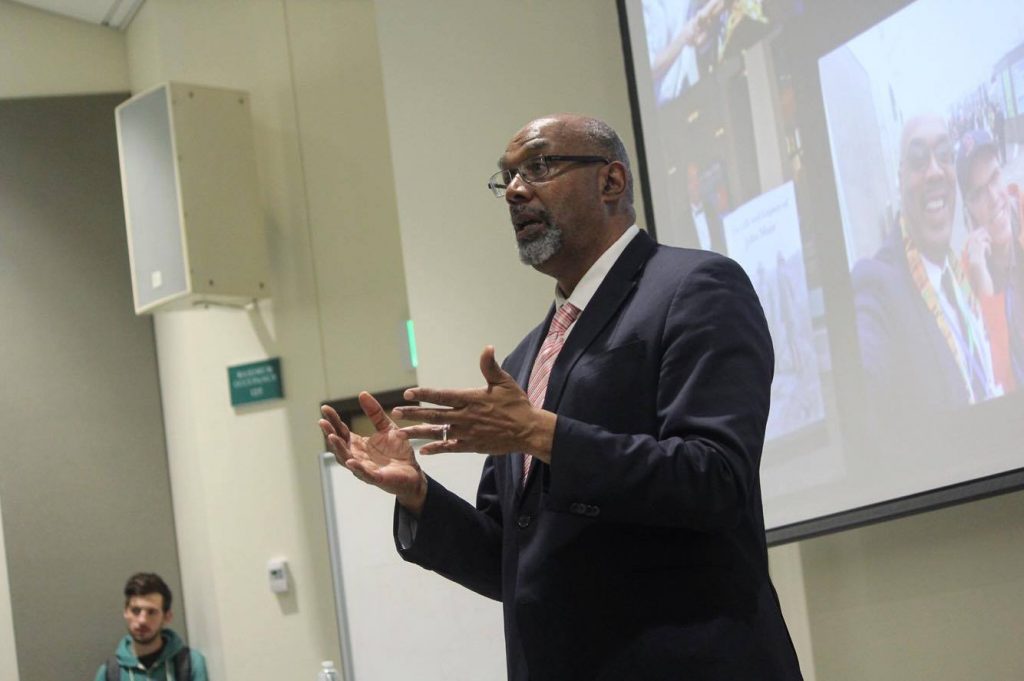
On Thursday evening, Aaron Mair, the president of the national Sierra Club and a Binghamton University alum, delivered a speech, “Deeper Shade of Green: the Binghamton Intellectual Roots of an Environmental Justice Activist and Thought Leader.” Mair traced his steps from undergraduate to president of one of the leading environmental activist groups in the United States while pleading for the importance of a more dynamic approach to environmental issues.
Mair is the first African American president of the Sierra Club, an organization founded in 1892 aimed at education and promotion of environmentally friendly policy. Mair described his journey from a working-class family with roots in social activism. His father was a labor organizer and he came to BU as the first in his family to pursue a college degree.
He graduated from the University in 1984 with a bachelor’s in history and sociology. After college, he focused on grass-roots activism and social justice, a journey that brought him to Albany in the early 1980s. It was there that his daughter developed environmental asthma because of a local power plant that polluted the air near his home.
“Having a clean, green place to raise my children was really important,” Mair said.
Mair stressed the importance intersectionality must play within the environmental protection community. Communities of color, like his own in Albany, and low-income areas bear the brunt of environmental degradation because they don’t have representation and the means to mobilize.
“The modern environmental movement, as you know it today, is anchored in all those movements of struggle,” Mair said. “In fact, its principles of nonviolent, civil resistance and engagement are actually borrowed from the civil rights struggle.”
Mair also pressed for an expansion of diversity within environmental organizations themselves. He is part of an effort to break “the green ceiling,” or the barrier to racial diversity within environmental organizations and agencies.
“Diversity is more than a number, it is also about bringing in that experience,” Mair said.
Mair stated that the solution to environmental issues can be found within activist organizations if they embrace diversity. He praised the University’s multidiscipline approach, and its “cross-pollination” between majors, in addressing environmental and policy issues.
The speech was organized by the Office of Alumni Engagement and the College of Community and Public Affairs. It is part of an ongoing effort by the University to bring alumni and students together.
Steve Seepersaud, the alumni communications manager, said that students greatly benefit from learning about alumni and their experiences.
“By seeing the accomplishments of our alumni, our students can see the tremendous value of a Binghamton University degree,” Seepersaud said.
Harold Jones, a sophomore double-majoring in geology and environmental studies, said that an inclusive approach will benefit the environmental movement in the long run.
“I think it’s great how he’s trying to really bring together a variety of issues,” Jones said. “It’s not just about environmental issues, it encompasses social issues. I think that will be really great in trying to get more people concerned about this.”
Hannah Elliott, a junior majoring in anthropology, said she was inspired by Mair and his accomplishments.
“I came here not exactly knowing what to expect … but this man, Aaron Mair, he’s an inspiration,” Elliot said. “People really need to start grasping these issues, because they’re really important … they’re life-changing.”
Mair’s journey, Elliot said, left a lasting impression.
“Especially seeing someone who graduated from Binghamton and he’s the president of the Sierra Club,” Elliot said. “It’s incredible.”


